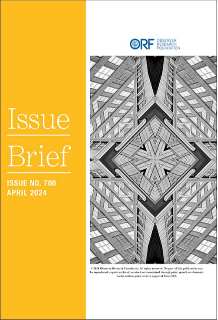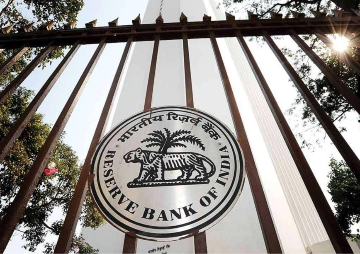The Second India Think Tank Forum, with focus on 'The potential and Power of National, Regioanal and Global Partnerships,' was organised in New Delhi by Observer Research Foundation (ORF), Think Tanks and Civil Societies Program, University of Pennsylvania (TTCSP) and the McKinsey Global Institue, McKensy & Company from 19 June.
ORF Director Sunjoy Joshi welcomed the participants of the three day conference, attended by scholars and experts from most of the country's prominent think tanks. He said there is an opportunity for many of us in India and other developing countries to be co-creators of the new knowledge systems and indeed the new software as well as hardware that will fashion much of the 21st century that lies ahead of us.
"Are we ready for that? Are we gearing up for that? And what are the key ingredients for us to be significant contributors to the new frameworks that will define the 21st century," he asked.
A lot of that, Mr. Joshi said, will need to come from think tanks and many of them are sitting in this room. "Can we fashion a new global integration project which has elements of plural trade ethic, migration of people, movement of knowledge, pricing of intellectual property, distribution of global public goods that will allow us to respond to the key challenges of poverty, human security, the lack of health, education and gender equality that still afflict over half the global population."
Mr. Joshi said this is our imperative. But we have three challenges.
First, to create knowledge systems you need human resources with the capacity to produce knowledge. And traditionally the countries which need to discover these solutions are also constrained by having less invested human capital. Our challenge is to produce enough knowledge creators in a world that only values knowledge. To be beneficiaries of the knowledge age, we need knowledge evangelists, knowledge entrepreneurs and a knowledge supply chain, which begins at minimal skills and peaks at maximum innovation. Investing in human resources is time consuming, sometimes the length of achieving a PhD at other times a secondary school education through skill enhancement programmes.
Second, most knowledge systems around the western world are well integrated systems with national budgets, national laboratories, defence organisations, foreign policy establishments. Countries in the global south find that their governments do not have the wherewithal to invest in these. So we will have to create, raise money and find funds outside the governmental systems. So raising resources to fund the knowledge industry is a second challenge. Traditionally it has been government and national and international organisations, with some minimal private sector support occasionally thrown in. Perhaps we need to be smarter and look at crowd sourcing to mobilise millions of small contributions.
The third is that the market place of ideas has become quite a manic place — the age of information also suffers from chronic Attention Deficit Hyperactive ADHD as well as OCD (Obsessive Compulsive) at the same time. How does one find even elbow room in the petabytes and zettabytes of text masquerading as thought. And in that crowd make sure that your ideas find legs to run? How do you communicate those ideas? The new media provides both the threat and the opportunity. How do we locate and place our staple well researched long form pieces that are still our bread and butter. How do we link them to opeds that mobilise political thought or a cascade of tweets that create mass movements. Where do we locate think tanks in this cross section of communication, platforms and communication styles?
Mr. Joshi said, "These are all questions. What will the new trade regimes look like? Who will shape them? What will be the knowledge architecture behind those regimes?"
He expressed the hope that the conference over the next two days will discuss these issues, trying to bring together key questions around the themes on trade, security, cyber, climate change and international relations besides conversations on think tanks itself.
After Mr. Joshi's welcome remarks, there was a panel discussion on 'Big Politics: OBOR, India and the Liberal International Order.' While it was moderated by Dr. Sanjaya Baru, Distinguished Fellow, USI, the speakers included Indrani Bagchi, Diplomatic Editor, Times of India, Nitin Pai, co-founder, Takshashila Institute, Lt. Gen. Aditya Singh, Senior Fellow, Delhi Policy Group and Seshadri Vasan, Chennai Centre for China Studies.
It was followed by 'Three Years of the Modi Government: Looking Back, Looking Forward' — a conversation with Smt. Smriti Irani, Union Textiles Minister. It was moderated by Ashok Malik, Distinguished Fellow, ORF. The minister explained the work and major schemes being done by the government for the welfare of the poor. She said the poor quality of raw materials in the silk, jute, handloom and cotton industries were standing in the way of the government's efforts to diversify products and improve the quality of the final product for better imports.
The second day of the conference began with opening remarks from Dr. Jim McGann, Director, TTCSP, Dr. Samir Saran, Vice President, ORF, and Anu Madgavkar, Partner, McKinsey Global Institute. This was followed by a discussion on 'Globalisation 2.0: Managing the Transition and the Tensions', chaired by Mr. Alok Bansal, Director, India Foundation. This panel of Dr. Harsh Pant, Distinguished Fellow, ORF, Francoise Nicolas, Director AFRI, Anu Madgavkar of the McKinsey Global Institute and Sybil Delaine Rhodes, Vice President, Centre for Openness and Development in Latin America, explored the emerging trends in international politics and how these would shape the 21
st century. It explored the space for India in a world where multiple hegemons exist, each with its own vision of world order.
There were also discussions on 'India's Urbanisation Challenges', 'Big Ideas, Big Data and Small Tweets: Think Tanks, Technology and Policy Advice' and 'Disruptive Technologies and the Future of Work in India.' The urbanisation panel of Dr. Shaleen Singhal (Teri University), Dr. Rumi Aijaz (ORF), Renu Khosla, Director, Centre for Urban and Regional Excellence, Bharat Palavalli (Co-Founder, Fields of View) and D. Dhanuraj (Centre for Public Policy Research, Kochi) explored the urbanisation challenges facing India. The panel on 'Big Ideas, Big Data and Small Tweets' included shruti Pandalai, Associate Fellow, IDSA, Shivnath Thukral, Managing Director, Carnegie India, Maya Mirchandani, Senior Fellow, ORF, Ananth Padmanabhan, Fellow Carnegie India, Neeraj Kumar, Managing Editor, Asian Development Research Institute and V.S. Sambandan, Chief ADminstrative Officer, The Hindu Centre for Politics and Public Policy.
The panel on disruptive technologies — Rajath Kathuria, Director, ICRIER, Vandana Bhatnagar, Chief Programme Officer, National Skill Development Corporation, Indira Hirway, Director, Centre for Development Alternatives, Marc Saxer of Friedrich Ebert Stiftung and Reuben Abraham, CEO, IDFC Institute — explored the impact of disruptive technologies on labour markets and the societies as a whole.
There was an interesting discussion on 'The Fith Estate: Think Tanks, Public Policy and Governance in the US and India' by panelists James McGann (TTCSP), Manjeet Kriplani, Executive Director, Gateway House and Harsha Vardhana Singh, Executive Director, Brookings India. It was moderated by Suvojoy Sengupta, Partner, McKinsey Global Institute.
The session on 'The New Cold War: Information and Cyber Wars' examined how digital networks that transcend communities, ideas and languages, have affected the traditional role of the state in securing its borders even as the social contract between the state and the citizen is being mediated by the 'intermediary' usually a technology giant — whose role has come under the political scanner. This panel included Suhasini Haidar, Deputy Resident Editor, The Hindu, Udbhav Tiwari, Policy Officer, Centre for Internet and Society, Nalin Surie, Director General, ICWA, Subramaniam Chandrasekhar, Group Director, Government Affairs, Microsoft India and Arun Sukumar, Head Cyber Policy Initiative, ORF.
The session on 'Health Futures 2030: Leaving No One Behind' explored how Indian can provide an umbrella of health services and infrastructure that supports the delivery of these services, which are critical for its greater ambitions. The panel comprised Shaktivel Selvaraj, PHFI, Sonalde Desai, Senior Fellow, NCAER, oommen C Kurian, Fellow, ORF and Sushma Kapoor, Vice President, Global Health Services. It was chaired by Rama V. Baru, Professor, Centre of Social Medicine and Community Health, Jawaharlal Nehru University.
The second day ended with 'Discussing the Indian Economy and Policy Making — In Conversation: Sanjeev Sanyal', Principal Economic Advisor, Ministry of Finance, Government of India. It was moderated by Gautam Chikermane, Vice President, ORF.
The views expressed above belong to the author(s). ORF research and analyses now available on Telegram! Click here to access our curated content — blogs, longforms and interviews.




 PREV
PREV

